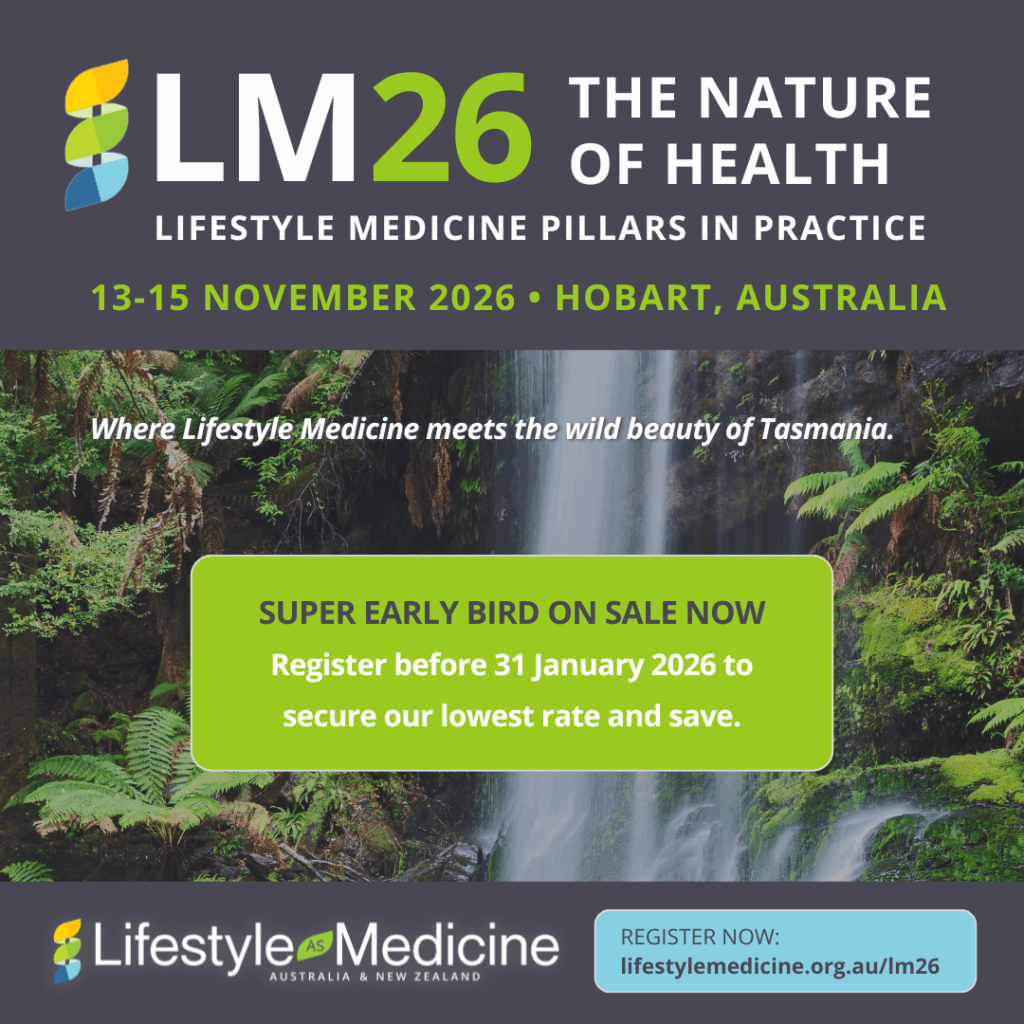About The Australasian Society of Lifestyle Medicine (ASLM)
The Australasian Society of Lifestyle Medicine (ASLM) is a health promotion charity working towards improved prevention, management, and treatment of chronic, complex, and lifestyle-related conditions. ‘Lifestyle-related’ includes environmental, societal, behavioural and other factors.
At ASLM we support an interdisciplinary approach to health and healthcare; shifting away from siloed practice to create a genuinely collaborative means through which complex problems can be solved.
We advocate for health and wellbeing, which includes the absence of disease, but also health equity, social justice, corporate responsibility, and environmental sustainability.
Our vision
For all Australians and New Zealanders to be happier, healthier, and living longer through lifestyle as medicine.
Our mission
To promote health and wellbeing through the interdisciplinary delivery of evidence-based Lifestyle Medicine in health and community settings.
What we do
ASLM is a leading member of a global network of Lifestyle Medicine societies all working to establish Lifestyle Medicine as central to health and wellbeing, medicine, healthcare and health policy.

Training health professionals in Lifestyle Medicine
We provide CPD education and professional development training for medical and allied health practitioners to support the integration of Lifestyle Medicine into primary care practice.

Empowering practitioners of the future
We fight for better Lifestyle Medicine education in universities, and provide student leadership opportunities in Lifestyle Medicine to empower the next generation of health practitioners.

Advocating for healthcare reform
We advocate for healthcare reform to ensure Lifestyle Medicine is always considered in the treatment of chronic disease.
Our position
ASLM has developed evidence-based position statements for each of the pillars of Lifestyle Medicine (LM). The pillars we describe in LM include but are not limited to social connection, stress management, alcohol overconsumption and tobacco cessation, climate and environment, sleep, diet, exercise, and culture. You can view more information on the pillars here.
We recognise the range of limitations an individual may face regarding the LM pillars, including factors relating to accessibility, culture, and financial limitations. In all instances, we encourage health care professionals to work with their clients to ensure personalised advice that incorporates but also extends beyond the following understandings and recommendations.
Our position
Humans are social beings who thrive when they can build positive relationships and social connections in both individual and group settings. Social connection in all its forms is vital for mental and physical wellbeing, and encompasses culture, connection to country, and community. There is no “correct dose” as far as how many relationships one should build and maintain or how often we should be connecting with others.
People should work with healthcare and social care professionals to better understand the opportunities available to them in order to build strong, healthy social connections. Healthcare practitioners are encouraged to explore a person’s existing networks and social opportunities to identify and, where appropriate and possible, facilitate more opportunities for social connection. Practitioners may be able to support social connection by way of initiatives such as social prescribing and shared medical appointments (SMAs)
Key points
- Social connection (or disconnection) has an impact on public health which is comparable to other major health measures such as weight and prevalence of chronic disease1
- Social disconnection is considered a severe and urgent concern for public health professionals because those who lack connection are more at risk for premature mortality2
- Those with consistent social connection are more likely to live longer3
- A meta-analysis of 140 studies indicated lack of social connection has similar effects on life expectancy as smoking 15 cigarettes per day4
- People with strong, healthy relationships are more likely to be satisfied with and have a higher quality of life5
- Social connectedness is more likely to be an indicator of overall mental health status than mental health status is on one’s ability to have social connections6
- Social connection can lower anxiety and improve mood, self-esteem, cognition, and stress management7
- The epidemiological health perspective is that social connectedness is a form of capital for which individuals can draw upon to improve health and which can improve mental health6
References
- Holt-Lunstad J, Robles TF, Sbarra DA. Advancing social connection as a public health priority in the United States. Am Psychol. 2017 Sep;72(6):517-530. doi: 10.1037/amp0000103. PMID: 28880099; PMCID: PMC5598785.
- Umberson D, Montez JK. Social relationships and health: a flashpoint for health policy. J Health Soc Behav. 2010;51 Suppl(Suppl):S54-66. doi: 10.1177/0022146510383501. PMID: 20943583; PMCID: PMC3150158.
- House J, Landis K, Umberson D. Social Relationships and Health. Science. 1998;241(4865): 540-545. Doi: doi/10.1126/science.3399889.
- Holt-Lunstad J, Smith T, Layton J.B. Social Relationships and Mortality Risk: A Meta-analytic Review. PLOS Medicine. 2010l Jul. DOI: https://doi.org/10.1371/journal.pmed.1000316.
- vic.gov.au. 2022. Strong relationships, strong health – Better Health Channel. [online] Available at: <https://www.betterhealth.vic.gov.au/health/healthyliving/Strong-relationships-strong-health#health-benefits-of-strong-relationships> [Accessed 29 June 2022].
- Saeri AK, Cruwys T, Barlow FK, Stronge S, Sibley CG. Social connectedness improves public mental health: Investigating bidirectional relationships in the New Zealand attitudes and values survey. Australian & New Zealand Journal of Psychiatry. 2018;52(4):365-374. doi:10.1177/0004867417723990
- State of Queensland (Metro South Health). Food and cultural practices of the Māori community in Australia – a community resource. 2015. Retrieved from: https://metrosouth.health.qld.gov.au/sites/default/files/content/heau-cultural-profile-maori.pdf.
Our position
Our ability to manage stress is a key component of health and wellbeing. Stress is highly interchangeable with the other Lifestyle Medicine pillars in that it can be both a cause and effect of lifestyle. Our ability to manage stress, both acute and chronic, can have upstream and downstream effects on both our mental and physical wellbeing.
The severity of any given stressor can be dependent on external factors such as natural disasters, living and working environments, climate changes, personal and professional interactions, and other events. People can be affected by stress regardless of the source, and our bodies are unable to decipher between diverse types of stress.
Coping strategies to deal with both acute and chronic stressors can improve mental and physical wellbeing and can impact and improve all aspects of health and wellbeing.
Key points
- Both acute and chronic stresses affect the mind and body. Acute stress can trigger breathing issues, asthma attacks, mood, and more1
- Chronic stress can increase risk of stroke, hypertension, heart disease, heart attacks, metabolic diseases, immune disorders, mental health issues, and more1
- Stress management techniques can improve a range of conditions, improving physical and mental health1
- Individuals who are unable to cope with varying levels and sources of stress may experience an increase in risk of alcohol use, eating disorders, smoking, and substance abuse disorders2
References
- American Psychological Association. Stress effects on the body. 2018 Nov. Retrieved from: https://www.apa.org/topics/stress/body.
- Stress Management and Emotional Health. Retrieved from: https://my.clevelandclinic.org/health/treatments/6409-stress-management-and-emotional-health/.
Our position
Alcohol overconsumption and all tobacco use have adverse health effects. While e-cigarettes, or vaping products, do not have the same degree of health risks as smoked tobacco, they are not completely without risk. Complete elimination of tobacco use, restricting any use of vaping to people who smoke, and minimal consumption of alcohol, where possible, is best for health.
Individuals should consult with their team of healthcare professionals to seek advice on tobacco cessation and alcohol consumption.
Key points
- Tobacco use is linked to range of diseases, many chronic1
- In Australia, tobacco use was linked to more than one in every eight deaths in 20181
- In New Zealand around 4,500 people die each year as a direct consequence of smoking2
- Smoking affects nearly every organ in the body and reduces the health of smokers overall3
- Tobacco cessation reduces the risk of disease caused by smoking and improves health3
- Both first-hand and second-hand smoke from tobacco usage have adverse health effects3
- Exposure to second-hand smoke increases likelihood of illness and death from adolescence to adulthood3
- For smokers who switch to vaping, and stop smoking completely, vaping is associated with reduced harm. However, vaping is not completely harmless4,5
- People who do not smoke should not vape. Never smokers who become regular vapers are likely to have an increased risk of adverse health events and become dependent on nicotine. There is also data to show that young non-smokers who start vaping are more likely to go on to initiate tobacco cigarette smoking compared with youth who do not vape,4,5
- In the short-term, over-consumption of alcohol can lead to risky behaviour, violence, accidents, and lack of consciousness
- In the long-term, excessive alcohol use can lead to mental health issues, cancers (e.g., breast, mouth, throat, oesophagus, liver, and bowel), fertility issues, high blood pressure, heart disease, stroke, liver disease social challenges, and financial problems, amongst other adverse effects6
References
- Stress effects on the body. Stress affects all systems of the body including the musculoskeletal, respiratory, cardiovascular, endocrine, gastrointestinal, nervous, and reproductive systems. American Psychological Association. 1 November 2018. https://www.apa.org/topics/stress/body.
- Manatu Hauora Ministry of Healthy. The New Zealand Guidelines for Helping People to Stop Smoking Update. 10 September 2021. Retrieved from: https://www.health.govt.nz/publication/new-zealand-guidelines-helping-people-stop-smoking-update
- Tobacco in Australia. June 2019. Retrieved from: https://www.tobaccoinaustralia.org.au/chapter-3-health-effects/3-0-background
- Puig-Cotado F, Tursan d’Espaignet E, St Claire S, Bianco E, Bhatti L, Schotte K, et al. Tobacco and Coronary Heart Disease: WHO Tobacco Knowledge Summaries [Internet]. World Health Organization; 2020. Available from: https://www.who.int/publications/i/item/9789240010628
- Middlekauff HR. Cardiovascular impact of electronic-cigarette use. Trends Cardiovasc Med. 2020 Apr;30(3):133–40.
- Australian Government Department of Health. What are the effects of alcohol? Available from: https://www.health.gov.au/health-topics/alcohol/about-alcohol/what-are-the-effects-of-alcohol
Our position
Our environment and climate are significant factors affecting public health. They are a major concern on both the individual and population health level as they have direct and indirect effects on mental and physical health.
Access to a clean and safe environment which is free of pollutants and full of natural “green and blue space” is important for overall health and happiness.
We adhere to the advice of the World Health Organization (WHO) on how climate impacts health: “Climate change is already impacting health in a myriad of ways, including by leading to death and illness from increasingly frequent extreme weather events, such as heatwaves, storms and floods, the disruption of food systems, increases in zoonoses and food-, water- and vector-borne diseases, and mental health issues. Furthermore, climate change is undermining many of the social determinants for good health, such as livelihoods, equality and access to health care and social support structures. These climate-sensitive health risks are disproportionately felt by the most vulnerable and disadvantaged, including women, children, ethnic minorities, poor communities, migrants or displaced persons, older populations, and those with underlying health conditions.”1
Key points
- Consistent access to green and blue spaces (think woodlands, parklands, and bodies of water) is linked to lower rates of depression and a 7% reduction in the risk of heart disease2
- Access to green and blue spaces is linked to lower stress levels, improved attention span, and increased longevity2
- Those who spend 120 minutes or more per week in green space are significantly more likely to report good health and/or high wellbeing3
- Climate change has adverse effects on food security, mental health, prevalence of infectious and communicable diseases, and stress1
- Individuals are at increased risk of poor mental health and suicidal ideation following natural disasters, which is especially true when an individual or community has experienced repeat disasters1
- In 2015, 1.6% of total deaths in Australia were attributed to air pollution1
- Those with underlying health conditions are even more at risk from poor air quality1,2
- Between 2030 and 2050, climate change is expected to cause approximately 250,000 additional deaths per year1,2
References
- World Health Organization. Climate change and health. 2021. Retrieved from: https://www.who.int/news-room/fact-sheets/detail/climate-change-and-health
- White, M.P., Alcock, I., Grellier, J. et al. Spending at least 120 minutes a week in nature is associated with good health and wellbeing. Sci Rep 9, 7730 (2019). https://doi.org/10.1038/s41598-019-44097-3
- Australian Institute of Health and Welfare. (2020). Natural environment and health. Retrieved from https://www.aihw.gov.au/reports/australias-health/natural-environment-and-health
Our position
Getting adequate quality, uninterrupted sleep at an average of seven to nine hours per night is ideal for human health, memory, recovery, learning, unlearning, energy conservation, and mental wellbeing (22). While the optimal time of quality sleep is subjective, these are the average requirements. Individuals may get less sleep than recommended, but this is not necessarily optimal.
Sleep supports immunity, recovery, memory, cognition, focus, and positive mood. The focus is not only on the time asleep, but on the quality of that time asleep.
ASLM adheres to the Sleep Health Foundation’s advice and research around the importance of sleep: https://www.sleephealthfoundation.org.au/
Key points
- Quality of sleep is important for overall quality of life1,2,5
- In a study of over 21,000 participants, those who self-reported getting good quality sleep had correlating positive effects on quality of life2
- Lack of quality sleep can lead to specific health conditions, including pulmonary hypertension and obesity3
- Both interrupted sleep and inadequate time asleep have adverse health effects
- Interrupted sleep over three consecutive days can reduce positive mood by over 30%1
- Consistent interrupted sleeping patterns over the span of a few years can greatly increase the risk of Alzheimer’s disease and dementia2
- Inadequate time asleep, while subjective, results in poorer immunity, mood, cognition, memory, and recovery3
- Sleep loss can increase risk of being overweight or obese, having increased blood pressure, and having an accident either in the workplace or on the road4
References
- Patrick H. Finan, PhD, Phillip J. Quartana, PhD, Michael T. Smith, PhD, The Effects of Sleep Continuity Disruption on Positive Mood and Sleep Architecture in Healthy Adults, Sleep, Volume 38, Issue 11, 1 November 2015, Pages 1735–1742, https://doi.org/10.5665/sleep.5154
- Sella, E, Miola, L, Toffalini, E, Borella, E. The relationship between sleep quality and quality of life in aging: a systematic review and meta-analysis. Retrieved from: https://www.tandfonline.com/doi/citedby/10.1080/17437199.2021.1974309?scroll=top&needAccess=true
- Garbarino, S., Lanteri, P., Bragazzi, N.L. et al. Role of sleep deprivation in immune-related disease risk and outcomes. Commun Biol 4, 1304 (2021). https://doi.org/10.1038/s42003-021-02825-4
- Sleep Foundation. Physical Health and Sleep. 2022. Retrieved from: https://www.sleepfoundation.org/physical-health
- Fadzil A. Factors Affecting the Quality of Sleep in Children. Children. 2021; 8(2):122. https://doi.org/10.3390/children8020122
Our position
The food we eat is critical to maintaining good health. When it comes to diet and eating patterns there is no one-size-fits all. There is an array of evidence-based approaches for which the “best” diet choice is subjective and dependent on many factors. These include but are not limited to culture, accessibility, traditions, preferences, prevalence of disease or illness, ethics, morals, learned behaviour, freedom of choice, education, sustainability, and affordability.
ASLM promotes a range of evidence-based dietary approaches that are based on whole nutrient dense foods and avoidance of ultra-processed products for the prevention and/or treatment of chronic disease based on biopsychosocial-cultural and spiritual personalisation. More intensive medical nutrition therapies may also be required.
Animal products can be included in a healthy diet with a focus on omega 3 rich sources such as fish and regenerative and sustainable agriculture livestock produce.
The benefits of food are not limited to specific ratios of macronutrients, but rather includes a wide number of factors including; quality and quantity of the produce, the order, timing and intervals of food intake, the unique bio-psycho-social profile of the one consuming the food, the cognitive, emotional and behavioural concepts and practices around food, the social and cultural context and sharing of food, and the ecological impacts. Hence, ASLM recommends a personalised and shared decision-making approach to nutrition.
We respect individual choice and encourage healthcare professionals and individuals to work together to determine the best choice for each person.
Key points
Below, we list a range of evidence-based diet strategies to prevent and/or treat chronic illness. This is not an exhaustive list, but rather an explanation of why there is not one single best diet from ASLM’s standpoint.
- For those with type 2 diabetes, following a low carb diet can lower blood glucose levels, reduce weight, and manage risk of developing heart disease, high blood pressure, and high cholesterol1
- Diets centred around vegetables, fruits, legumes, whole grains, and lean protein (including fish) are associated with decreased risk for depression2
- Diets including more processed and sugary foods are associated with higher risk for depression2
- For people with diabetes or at high risk for cardiovascular disease, a vegan diet can help lower overall cholesterol, weight loss and improve glycaemic control3
- For people with diabetes or at high risk for cardiovascular disease, a vegan diet can help lower overall cholesterol and improve glycaemic control3
- A semi-vegetarian (sometimes known as “flexitarian”) diet, which focuses on mostly plant-rich eating, suggests benefits for blood pressure, reduced risk of type 2 diabetes, and weight management4
- Research on the Mediterranean diet tells us the diet decreases the risk of cardiovascular disease and overall mortality5
References
- Diabetes Australia. Position Statement: Low carbohydrate eating for people with diabetes. 2018. Retrieved from: https://www.diabetesaustralia.com.au/wp-content/uploads/DiabetesAustralia-Position-Statement-Low-Carb-Eating.pdf.
Jacka, F.N., O’Neil, A., Opie, R. et al. A randomised controlled trial of dietary improvement for adults with major depression (the ‘SMILES’ trial). BMC Med 15, 23 (2017). https://doi.org/10.1186/s12916-017-0791-y - Eliška Selinger, Manuela Neuenschwander, Alina Koller, Jan Gojda, Tilman Kühn, Lukas Schwingshackl, Janett Barbaresko & Sabrina Schlesinger (2022) Evidence of a vegan diet for health benefits and risks – an umbrella review of meta-analyses of observational and clinical studies, Critical Reviews in Food Science and Nutrition, DOI: 1080/10408398.2022.2075311
- Derbyshire EJ. Flexitarian Diets and Health: A Review of the Evidence-Based Literature. Front Nutr. 2017 Jan 6;3:55. doi: 10.3389/fnut.2016.00055. PMID: 28111625; PMCID: PMC5216044.
- Harvard School of Public Health. Diet Review: Mediterranean Diet. Retrieved from: https://www.hsph.harvard.edu/nutritionsource/healthy-weight/diet-reviews/mediterranean-diet/
Our position
All individuals should participate in consistent, enjoyable daily activity. Ideally, this would include a mix of resistance training and cardiovascular exercise and both moderate and vigorous physical activity. ASLM supports the Australian Government Department of Health guidelines for optimal effects from exercise. These guidelines recommend 2.5 to 5 hours of moderate intensity physical activity and 1.25 to 2.5 hours of vigorous intensity physical activity per week. (1) ASLM also recognises this may not be feasible for each individual, and therefore supports a minimum of 30 minutes of movement most days of the week as recommended by the National Heart Foundation of Australia2.
Several factors affect one’s ability, capacity, and/or desire to participate in physical activity. These include but are not limited to culture, accessibility, traditions, preferences, prevalence of disease or illness, ethics, morals, learned behaviour, freedom of choice, and education. ASLM supports a collaborative approach between individuals and their health care professionals to find activities best suited to that individual’s needs, ability and progress.
Key points
- Consistent exercise supports weight management and improves prevention and management of chronic conditions such as heart disease, type 2 diabetes, and high blood pressure3
- Exercise supports positive mental health and creates opportunities for social connection4
- Consistent exercise is beneficial for nearly all adults and has a wide range of benefits for generally healthy as well as people with obesity or who are overweight5
- Aerobic exercise benefits the brain, slowing the age-related loss of brain tissue6
- Those who exercise regularly are more capable of processing information quickly and focusing attention6
- Exercise can improve heart health, lower blood sugar, help control the frequency and severity of asthma attacks, and reduce body pain by improving strength and reduce stiffness7
- Physical inactivity and lack of social connection together increase the risk of chronic health issues, including hypertension, diabetes, depression, and dementia8
- Physical inactivity increases risk of musculoskeletal conditions8
References
- Australian Government Department of Health. Physical activity and exercise guidelines for all Australians. Retrieved from: https://www.health.gov.au/health-topics/physical-activity-and-exercise/physical-activity-and-exercise-guidelines-for-all-australians/for-adults-18-to-64-years
- 2022 National Heart Foundation of Australia. Lifestyle Physical Activity. Retrieved from: https://www.heartonline.org.au/articles/exercise/exercise-prescription#lifestyle-physical-activity
- Reifels, Lennart; Spittal, Matthew J.; Dückers, Michel L. A.; Mills, Katherine; Pirkis, Jane (2018). Suicidality Risk and (Repeat) Disaster Exposure: Findings From a Nationally Representative Population Survey. Psychiatry, (), 1–15. doi:10.1080/00332747.2017.1385049
- Springmann, M, Clark, M, Scarborough, P, Webb, P. The global and regional costs of healthy and sustainable dietary patterns: a modelling study. The Lancet Planetary Health. 2021; 5(11). DOI: https://doi.org/10.1016/S2542-5196(21)00251-5
- Garber, Carol Ewing PhD, FACSM, FAHA, FNAK The Health Benefits of Exercise in Overweight and Obese Patients, Current Sports Medicine Reports: August 2019 – Volume 18 – Issue 8 – p 287-291. doi: 10.1249/JSR.0000000000000619.
- Gomez-Pinilla F, Hillman C. The influence of exercise on cognitive abilities. Compr Physiol. 2013 Jan;3(1):403-28. doi: 10.1002/cphy.c110063. PMID: 23720292; PMCID: PMC3951958.
- Mayo Clinic. Exercise and chronic disease: Get the facts. Retrieved from: https://www.mayoclinic.org/healthy-lifestyle/fitness/in-depth/exercise-and-chronic-disease/art-20046049.
- A. Merchant;J. E. Morley;Mikel Izquierdo; (2021). Exercise, Aging and Frailty: Guidelines for Increasing Function . The journal of nutrition, health & aging, (), –. doi:10.1007/s12603-021-1590-x
Our position
Culture, traditions, and sociocultural backgrounds impact all pillars of Lifestyle Medicine. We recognise Australian First Nations peoples’ wisdom is the oldest continuous culture and that their definition of health and wellbeing includes connection to country, spirituality, and ancestry. We also acknowledge the parallels of this definition with the pillars of Lifestyle Medicine, which specifically recognises the health impacts of meaninglessness, alienation and loss of culture and identity, and includes the importance of connection to family, community and land (or country).
Culturally responsible models of care that engage community and address the social determinants of health are essential for appropriate care. Violence, dispossession, alienation and disruption to culture that has resulted from colonisation continues to play a significant role in the inequity of health and opportunity still acting on First Nations people in Australia and New Zealand and all other countries where First Nation people have been marginalised. ASLM rejects racism in all forms and embraces equity, inclusion and diversity.
We encourage all our non-Indigenous members and followers to reflect on our relationship with First Nations people, find culturally responsive ways to work together, support a First Nation’s economy and self-determination, and create new opportunities moving forward. It is our collective responsibility to open the door to new experiences and challenges and do the work required for true equality and the celebration of Indigenous knowledge and wisdom.
Key points
- Health status of indigenous peoples varies depending on their background, history, and other circumstances1
- Māori people in New Zealand have a significantly lower life expectancy as compared to non-Māoris1
- While life expectancy and overall health of indigenous populations in New Zealand, Australia, Canada, and the United States has improved over time, it has never matched that of non-indigenous populations1
- Researchers suggest differences in health are due to four major areas, including socioeconomic factors, lifestyle factors, access to healthcare, and discrimination1
- Aboriginal and Torres Strait Islander people in Australia are over 2x as likely to experience chronic disease as non-Indigenous Australians2
- The traditional forms of healing practised by Aboriginal and Torres Strait Islander people in Australia have been majorly affected by the impacts of colonisation, which has removed and disconnected the people from their land3
- For many First Nations people, traditional healing practices take place through traditional healers, which was part of traditional medicine prior to colonisation3
References
- Ellison-Loschmann L, Pearce N. Improving access to health care among New Zealand’s Maori population. Am J Public Health. 2006 Apr;96(4):612-7. doi: 10.2105/AJPH.2005.070680. Epub 2006 Feb 28. PMID: 16507721; PMCID: PMC1470538.
- National Aboriginal Community Controlled Health Organisation. Measuring the Gap in Health Expenditure: Aboriginal and Torres Strait Islander Australians. 2022. Retrieved from: https://www.naccho.org.au/app/uploads/2022/05/NACCHO-and-Equity-Economics-Report-Measuring-the-Gap-in-Health-Expenditure_FINAL.pdf.
- Australian Indigenous HealthInfoNet. Traditional healing and medicine. Retrieved from: https://healthinfonet.ecu.edu.au/learn/cultural-ways/traditional-healing-and-medicine/
Our position
Many minority populations face health disparities. These populations may include but are not limited to First Nations people, those with disability, those who identify in the LGBTQIA+ population, and cultural or ethnic minority groups. Such populations may have unique, and many times additional, barriers to access and implement general population health advice as well as the advice embedded in the pillars of LM. Marginalisation, stigma, discrimination, lack of responsive and inclusive care, financial factors, limited education, and other determinants contribute to health risks.
ASLM recognises these barriers and works to promote socially and culturally responsive healthcare. We recognise there is a difference between health disparities and minority health. We expand beyond the standard pillars of LM to include social and cultural determinants of health as these factors affect ability to access and implement all remaining pillars of LM.
Key points
- Social determinants impact an individual’s or population’s likelihood to face health disparities3
- The outcomes of health disparities include greater burden of disease, premature mortality, poorer health behaviours and clinical outcomes, greater global burden of disease, and worse outcomes of self-reported measures reflecting daily functioning or symptoms of specific conditions3
- Many ethnic minority populations experience health inequities due to a range of factors, including lower health literacy, language barriers, and a sense of disempowerment2
- An individual’s culture, ethnicity, and language are increasingly recognised as significant predictors of the quality of healthcare and health outcomes experienced2
- The LGBTQIA+ population is at increased risk for depression, suicidal ideation, generalised anxiety disorder, substance abuse, and sexually transmitted diseases1
- There is limited, if any, education around sexual identity and gender in healthcare1
- There is a direct correlation between comfort in disclosing information around sexual identity and gender to providers and effective, consistent care1
References
- Candace W. Burton, Kevin Nolasco and Dave Holmes, Queering nursing curricula: Understanding and increasing attention to LGBTQIA+ health needs, Journal of Professional Nursing, https://doi.org/10.1016/j.profnurs.2020.07.003
- Chauhan, Ashfaq; Walton, Merrilyn; Manias, Elizabeth; Walpola, Ramesh Lahiru; Seale, Holly; Latanik, Monika; Leone, Desiree; Mears, Stephen; Harrison, Reema (2020). The safety of health care for ethnic minority patients: a systematic review. International Journal for Equity in Health, 19(1), 118–. doi:10.1186/s12939-020-01223-2
- Duran, Deborah G.; Pérez-Stable, Eliseo J. (2019). Novel Approaches to Advance Minority Health and Health Disparities Research. American Journal of Public Health, 109(S1), S8–S10. doi:10.2105/AJPH.2018.304931

Our people
ASLM is governed by a volunteer board of doctors, allied health practitioners, public health professionals, educators and health executives. We are grateful for their commitment to advancing Lifestyle Medicine in Australasia, and the guidance they provide in relation to ASLM’s strategic direction and purpose.

Our partners
ASLM is proud to partner with a range of vision-aligned organisations across Australia and New Zealand and acknowledges it will take a combined whole-of-system effort to achieve improved, more sustainable and more equitable health outcomes for all Australians and New Zealanders.
Get Involved
Help shape the future of health and add your voice to a growing movement.
Join
Gain access to our online member portal, professional development pathways, clinical resources and exclusive member discounts.
Support
Support us in continuing to provide valuable education, training, and resources to professionals and community improving the healthcare and wellbeing for all.
Stay informed
Connect with us for the latest Lifestyle Medicine research, news, events, professional development and opportunities.
Get in touch
Contact us today
Our team are here to assist you with any enquiries. Please email our office or submit a contact form today.
Phone: +61 03 7020 6996

